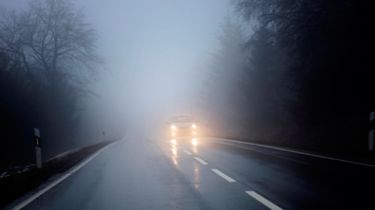Driving in fog: top tips
Foglights and driving tips – everything you need to know about driving in fog

Driving when there's fog has the potential to become very dangerous. Damp, cold conditions allow fog to develop, so winter is the time to remind yourself of what to do in foggy conditions, from maintaining a greater distance to the car in front, to when to use your foglights and headlights on full beam.
If at all possible, we recommend postponing or delaying your journey if you can see there’s thick fog outside. However, there’ll often be occasions when it develops once you’re already on your way, or you drive through a particular area where visibility drops. Below, we take a look at the precautions and measures you can take to help you complete a journey in fog safely.
Check your car
Regular general maintenance of you car is important, but there are specific things to check if it’s possible you’ll be driving in fog.
Make sure all your lights are working, front and back, including trying the foglight switch; it’s unlikely you’ll use the foglights that often (especially compared to the headlights) so it’s easier to miss when they aren’t working. Your rear foglights have to work by law, even if front foglights are optional.
The next thing to check is the car’s windscreen wipers. They’re subject to some harsh treatment from the weather and over time the condition of the rubber can deteriorate, leaving you with a streaky or smeary windscreen rather than one you can easily see through. Also make sure that the windscreen washer fluid is topped up with a good-quality concentrated or ready-mixed solution. Don’t be tempted to use water on its own, as this will be ineffective at clearing the windscreen and is liable to freeze in winter.
If you haven’t done so already – and you may not have if your car is new –familiarise yourself with how to demist the windscreen. Trying to peer through a misty windscreen only exacerbates the difficulty of driving in fog, so knowing how to quickly clear one is important. Turning on the air-conditioning helps dehumidify the cabin, which clears a misty windscreen more quickly.
Make sure the heating system isn’t set to recirculate the air in the cabin. Some vehicles are also fitted with a heated windscreen, so consult your handbook to investigate the best way to clear your windows.
You can also read our detailed winter driving tips article to find out all the things you need to be aware of in the colder months.
Slow down and use caution
The biggest danger caused by fog is the reduced distance you can see, giving you less time to react to the road, traffic and obstacles. For this reason the first thing to do is slow right down.
When visibility is below 50 metres, the Met Office considers it ‘dense fog’ and considering the average car travelling at 50mph takes 53 metres to come to halt, your speed should be very low. It’s also important to leave a large gap behind the car driving in front.
Dipped headlights and foglights
When driving in fog, it’s important to use dipped headlights, because sidelights aren’t powerful enough to see or be seen, while your main beam will typically bounce back off the fog, reducing your visibility and dazzling other road users. If thick fog reduces visibility to less than 100 metres, turn on your rear foglights to warn following drivers of your presence.
If you have front foglights, turn them on, too: they’re designed to illuminate the road in poor conditions. Just remember to turn all foglights off as soon as it clears: they are extremely bright and will dazzle and irritate other motorists. The police can fine you for incorrect use.
Junctions in fog
In thick fog, junctions can pose a significant danger, making it difficult for you to see cars approaching and for them to see you pulling out. Strangely, this can be exacerbated in daytime, as you’re more likely to see the glow of approaching headlights at night.
One good idea is to turn off any music, open the window and listen for approaching vehicles – but remember cyclists, hybrid and electric cars may be hard to hear. Once you’re sure the road is clear, pull out decisively to minimise your time crossing the oncoming lane and get up to speed in case cars are approaching.
Freezing fog and black ice
When the weather is particularly cold, ‘black ice’ can form in patches on the tarmac. This can happen when freezing fog settles on the road and it’s one of the top dangers motorists face, as it’s almost impossible to see and makes grip almost non-existent.
Listen out for any warnings of freezing fog or black ice on the weather or traffic news and try to avoid badly affected routes or drive with extreme caution. Also drive particularly carefully over bridges, as the lack of insulating ground beneath the tarmac can make them even more susceptible to ice.
Fog is more common during autumn and winter, so for extra advice on maintenance and driving, take a look at our winter driving tips piece. If you want a new car that’s safe and reliable in winter, make sure to read our list of the top 10 winter cars.
Most Popular

New Smart #5 Brabus is a 637bhp far cry from the brand’s city car past

Best car leasing deals 2025: this week’s top PCH offers
Tips & advice

Car dashboard warning lights: what does each symbol mean?

Electric car charging stations: public networks, charger types, apps and maps







